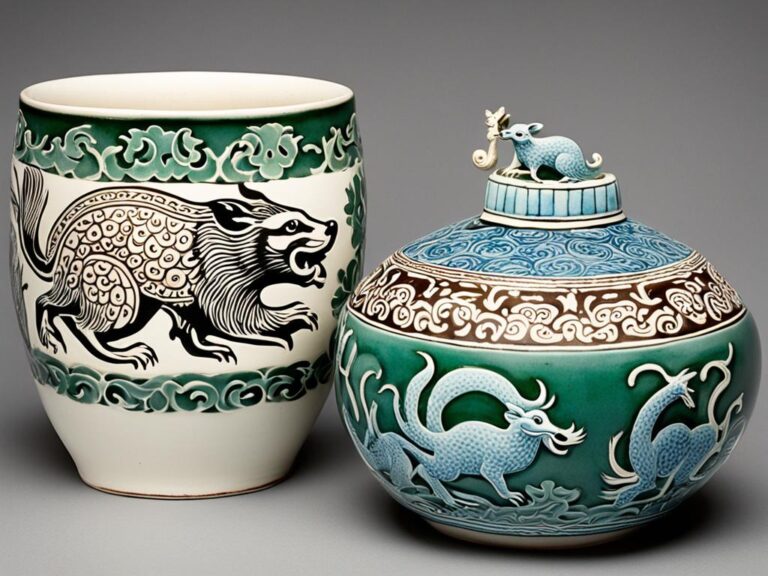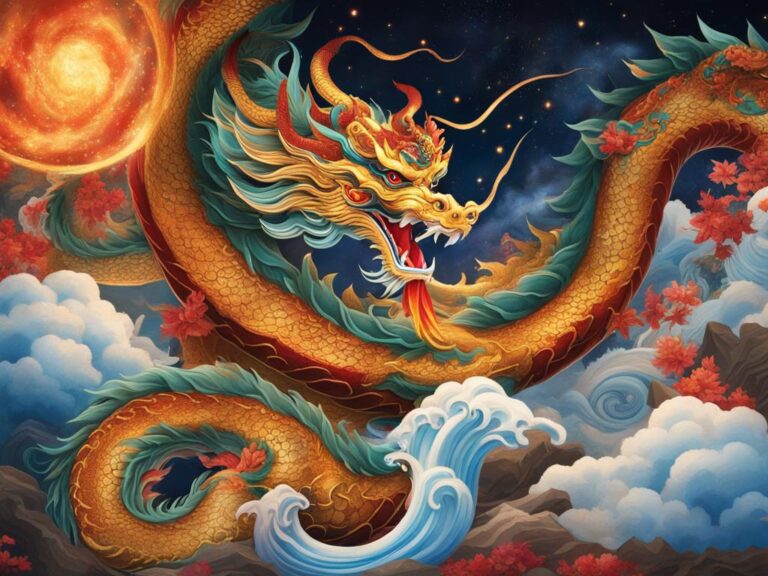The Zodiac in Ancient Chinese Astronomy : Astronomy in China has a long and rich history, dating back to the Shang dynasty over 3,000 years ago. The ancient Chinese people identified stars and categorized them in the twenty-eight mansions. Chinese astronomy focused on close observation of circumpolar stars and had different principles than Western astronomy. Chinese astrology, based on the positions of celestial bodies at a person’s birth, plays a significant role in Chinese culture with its twelve zodiac signs associated with animals.
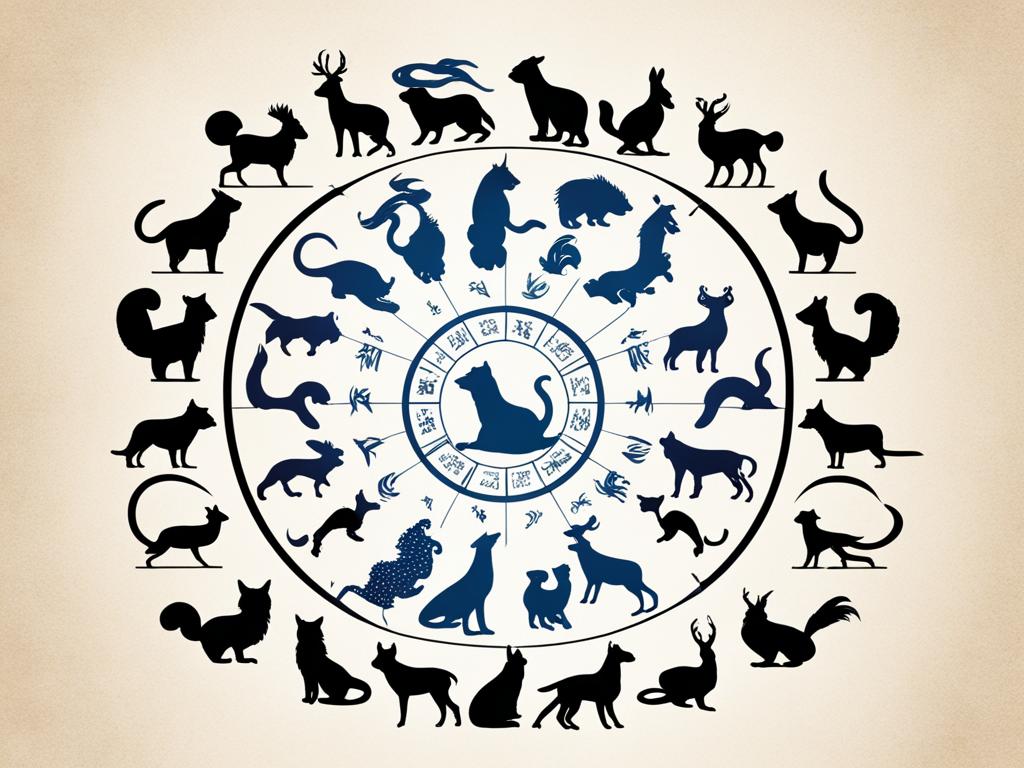
Key Takeaways:
- Chinese astrology is rooted in ancient Chinese astronomy.
- Ancient Chinese astronomers classified stars and made detailed observations.
- The Chinese zodiac consists of twelve animal signs.
- Chinese astrology provides insights into personality traits and compatibility.
- Chinese cosmology had unique models and constellations.
Ancient Chinese Astronomy and Observations
Ancient Chinese astronomers possessed a deep fascination with the heavens above, diligently studying celestial phenomena and making meticulous observations that laid the foundation for their understanding of the universe. These observations, recorded in star maps and catalogues, provide valuable insights into Ancient Chinese astronomy.
The Tang dynasty’s Dunhuang map, a remarkable artifact from this era, offers a glimpse into the ancient Chinese interpretation of the night sky. This map depicted stars from different schools of thought, showcasing the diversity of astronomical knowledge during that time. It featured an astonishing 1,300 stars, exemplifying the meticulous approach ancient astronomers employed to document and categorize the cosmos.
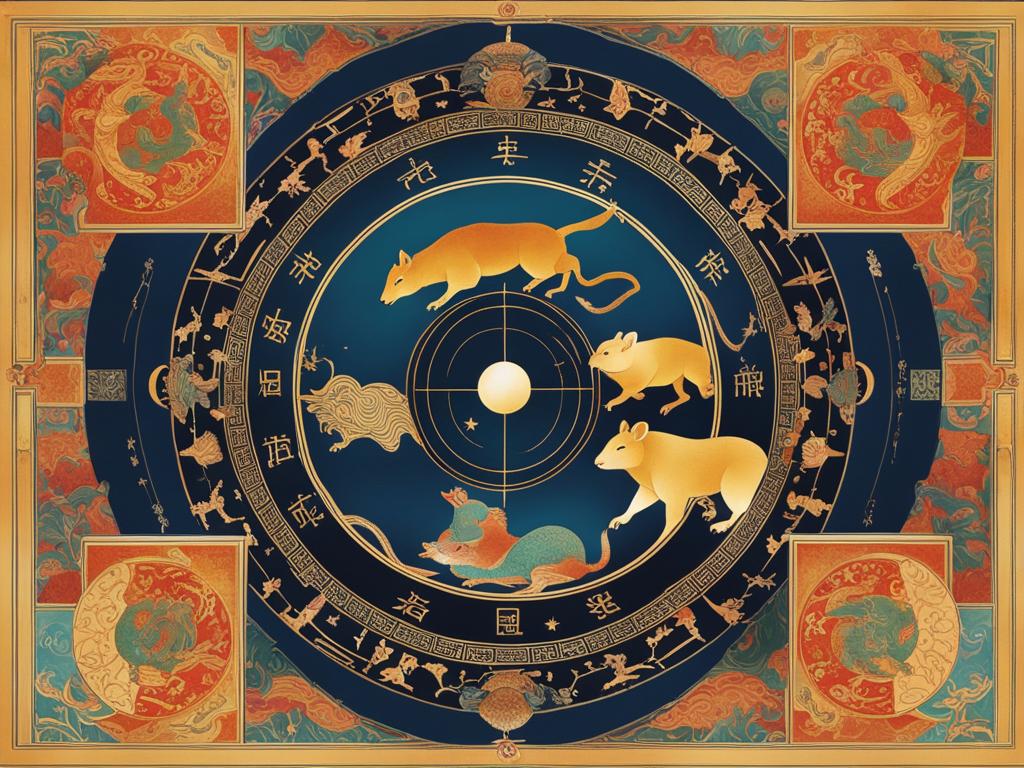
Ancient Chinese astronomers carefully classified stars into constellations, grouping them together based on their perceived patterns. This systematic approach not only enabled them to better understand the night sky but also served as a practical aid for navigation and timekeeping.
Star catalogues played a crucial role in the ancient Chinese astronomers’ quest for accurate and detailed records. By meticulously recording the positions of stars, these catalogues provided a comprehensive overview of the celestial realm. The catalogues allowed astronomers to track the movements of stars over time, identify changes in their brightness, and make predictions based on their observations.
Notably, ancient Chinese astronomers also diligently recorded the appearances of comets and supernovae. These celestial events, seen as important omens, were meticulously recorded and analyzed. Today, their observations continue to contribute to modern astronomical research, shedding light on the evolving nature of the universe.
“The stars, with their enchanting brilliance, captivated the minds of ancient Chinese astronomers, driving them to unravel the mysteries of the cosmos through meticulous observations and careful cataloging. Their dedication to understanding the celestial realm left a lasting legacy on the field of astronomy.”
Chinese Zodiac and Astrology
The Chinese zodiac, also known as Shengxiao, is a fascinating aspect of ancient Chinese astrology. It revolves around a twelve-year cycle, with each year associated with a specific animal sign. These animal signs are believed to have a profound influence on an individual’s personality traits and compatibility with others.
Chinese astrology combines the animal signs of the zodiac with the positions of celestial bodies at the time of a person’s birth to provide insights into their fate and character. By studying these celestial alignments, astrologers can uncover valuable information about an individual’s strengths, weaknesses, and potential future experiences.
Each animal sign in the Chinese zodiac represents distinct characteristics that are believed to shape a person’s behavior and influence their interactions with others. The symbols associated with the Chinese zodiac carry deep cultural meanings and hold significant value in Chinese society.
The Chinese zodiac animals are:
- Rat
- Ox
- Tiger
- Rabbit
- Dragon
- Snake
- Horse
- Goat
- Monkey
- Rooster
- Dog
- Pig
Each animal represents a different set of characteristics and traits that are associated with individuals born under that particular animal sign.
Understanding Chinese zodiac compatibility is a key aspect of Chinese astrology. By examining the compatibility between animal signs, individuals can gain valuable insights into their relationships with others. Compatibility charts and guidelines help people navigate their interactions and understand potential challenges and strengths in their connections with different zodiac signs.
The Chinese Zodiac Compatibility Chart:
| Zodiac Sign | Best Matches | Worst Matches |
|---|---|---|
| Rat | Dragon, Monkey, Ox | Horse, Goat, Rabbit |
| Ox | Rat, Snake, Rooster | Dragon, Horse, Goat, Dog |
| Tiger | Horse, Dog | Snake, Monkey |
| Rabbit | Goat, Dog, Pig | Snake, Rooster |
| Dragon | Monkey, Rat, Rooster | Dog, Rabbit, Dragon |
| Snake | Ox, Rooster | Tiger, Pig |
| Horse | Tiger, Goat, Dog | Rat, Ox |
| Goat | Rabbit, Horse, Pig | Ox, Dog |
| Monkey | Rat, Dragon, Snake | Tiger, Pig |
| Rooster | Ox, Snake | Rabbit, Dog |
| Dog | Tiger, Rabbit, Horse | Dragon, Goat, Rooster |
| Pig | Rabbit, Goat, Tiger | Snake, Monkey |
Discovering the compatibility between different animal signs can provide valuable insights into various relationships, including friendships, romantic partnerships, and even professional collaborations.
Accurate readings of Chinese zodiac characteristics and compatibility not only help individuals gain a deeper understanding of themselves but also enable them to navigate their interactions with others more effectively. Chinese astrology is a powerful tool that provides individuals with valuable insights into their personalities and relationships.
To fully appreciate the richness and significance of the Chinese zodiac and astrology, it is essential to delve deeper into the individual characteristics associated with each animal sign and explore their unique symbolism within Chinese culture.

Astrological Importance and Divination
Astrology played an important role in ancient China, with astronomers and astrologers using their observations of celestial phenomena for divination. Their understanding of the cosmos and its influence on human affairs allowed them to make predictions and guide decision-making processes. The accuracy of these predictions was crucial, as individuals sought assurance and guidance in crucial life events, such as marriages, births, and the rule of dynasties.
Astronomical Observations as a Foundation for Divination
Ancient Chinese astronomers meticulously observed celestial events, from the movement of planets to the appearance of “guest stars” like supernovae and comets. These phenomena were believed to hold profound meaning and were carefully recorded for future references in divination practices. By correlating these celestial observations with earthly events, astrologers sought to gain insights into the past, present, and future.
“By carefully studying the positions and movements of celestial bodies, ancient Chinese astrologers believed they could unlock secrets about one’s destiny and foresee significant events.”
Their observations provided the basis for the Chinese calendar, which was a crucial tool in divination. The lunar-solar calendar, with its intricate system of intercalation, not only served as a means to organize time but also carried symbolic and astrological significance. It marked the passage of dynasties, celebrated festivals, and helped individuals align their plans and activities with the movements of the heavens.
The Consultation of Astrologers
Consulting astrologers was considered essential before making major decisions or embarking on significant endeavors. These astrologers were highly respected individuals who possessed the knowledge and expertise to interpret celestial signs and symbols. Their role was to analyze the alignments of stars, planets, and other celestial bodies at specific moments and provide guidance and predictions based on their observations and astrological principles.
The Chinese believed that an individual’s destiny and fortune were influenced by the positioning of celestial bodies at the time of their birth. By examining these positions, astrologers could provide insights into an individual’s character, compatibility with others, and potential future success or challenges. This knowledge helped individuals navigate their lives and make informed choices.
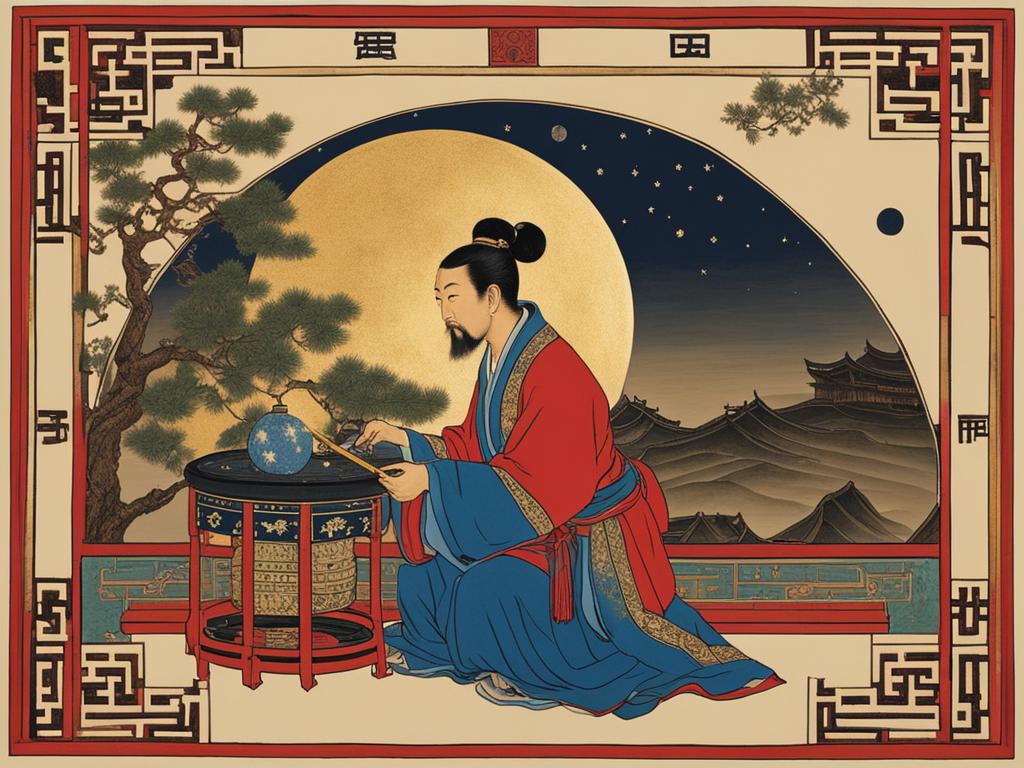
The image above depicts an astrologer performing divination, highlighting the important role it played in ancient Chinese society.
Through astrological divination and the interpretation of astronomical observations, ancient Chinese society sought to gain a deeper understanding of the universe and its influence on human existence. The connection between celestial phenomena and earthly events was seen as a reflection of an intricate cosmic order, adding a layer of guidance and meaning to the lives of the Chinese people.
Cosmology and Chinese Astronomy
Chinese cosmology differed greatly from Western astronomy, showcasing distinct models and perspectives that shaped their understanding of the celestial realm. Before Western influences, the ancient Chinese believed in a unique model known as the “canopy heaven.” In this model, the sky was described as a hemisphere, while the Earth was envisioned as a disc-shaped entity.
The Chinese also developed their own system of constellations, which played a crucial role in their astronomical observations. Two prominent constellations in Chinese cosmology were the Northern Dipper and the twenty-eight mansions. These constellations formed the foundation for celestial mapping and navigation.
Incorporating elements of yin and yang, the Chinese considered the sky to be infinite and connected it to their cosmological beliefs. This holistic approach to cosmology infused their understanding of the universe with a sense of balance and harmony.
Through their unique cosmology and system of constellations, the Chinese gained insight into the mysteries of the cosmos, providing a framework for their astronomical observations and astrological practices.
“The harmony of the universe lies in embracing the balance of yin and yang, as reflected in the intricate tapestry of Chinese cosmology.”
Conclusion
The Zodiac in Ancient Chinese Astronomy holds immense cultural significance and influences various aspects of Chinese society. Throughout history, ancient Chinese astronomers meticulously observed and cataloged celestial phenomena, laying the foundation for Chinese astrology. By studying the positions of celestial bodies at the time of a person’s birth, Chinese astrologers are able to provide insights into their compatibility with others and reveal their unique personality traits.
In addition to astrology, Chinese cosmology offers a distinct perspective on the heavenly bodies. Unlike Western astronomy, the ancient Chinese believed in a “canopy heaven” model, with a hemisphere sky and a disc-shaped Earth. They developed their own system of constellations, with the twenty-eight mansions and the Northern Dipper serving as crucial elements in their cosmological beliefs.
The rich tapestry of The Zodiac in Ancient Chinese Astronomy has left an indelible mark on Chinese culture and identity. It continues to shape the way people perceive themselves and their interpersonal relationships. Whether it’s consulting astrology for guidance in important decisions or appreciating the intricate system of constellations, the Chinese people’s connection with the celestial world endures, showcasing the enduring legacy of this ancient tradition.
FAQ
What is the Chinese zodiac?
The Chinese zodiac is a twelve-year cycle in Chinese astrology that associates each year with a specific animal sign, representing different personality traits and characteristics.
How does Chinese astrology determine compatibility?
Chinese astrology determines compatibility by analyzing the animal signs associated with each person’s birth year. Certain animal signs are believed to have a harmonious or challenging relationship with each other, influencing compatibility.
What are the characteristics associated with the Chinese zodiac animals?
Each animal sign in the Chinese zodiac has unique characteristics. For example, the rat is known for being intelligent and resourceful, while the tiger is associated with bravery and confidence.
What is the importance of astrology in ancient China?
Astrology played a significant role in ancient China, with astronomers and astrologers using observations of celestial phenomena for divination. Astrologers were consulted before important decisions, and celestial events were studied for predicting future events.
How did ancient Chinese astronomers observe celestial phenomena?
Ancient Chinese astronomers made detailed observations and cataloged celestial phenomena. They used star maps and catalogues to record the positions of stars. They also documented the appearances of comets and supernovae, which are still studied today.
What was the Chinese cosmological model and perspective?
The Chinese had a unique cosmological perspective, believing in a “canopy heaven” model with a hemisphere sky and a disc-shaped Earth. They also had their own system of constellations, such as the Northern Dipper and the twenty-eight mansions, and incorporated the elements of yin and yang into their cosmological beliefs.

